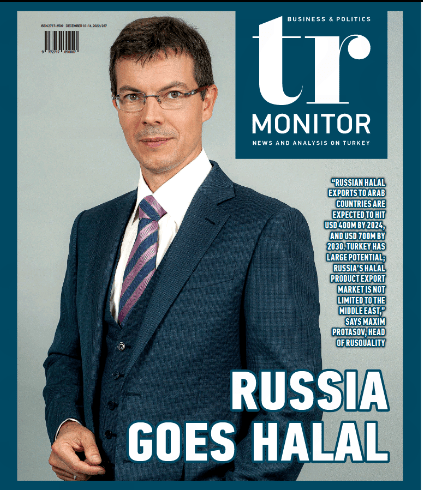BY BESTENIGAR KARA
Russia’s halal product export market is not limited to the Middle East, according to Maxim Protasov, Head of the Russian Quality System (RusQuality). Turkey also is interesting for the Russian Federation as a potential market for the exports of local, organic, and halal food. “The halal food market has become a significant segment of the global economy as consumer spending on halal food accounts for 17% of all consumer expenditures today,” Protasov said in an exclusive interview with TR MONITOR. “This figure is expected to reach 20% by 2025 and 25% by 2030 at least, according to experts.”
The Russian standards watchdog RusQuality (or Roskachestvo), which was established as a result of a directive by the Government of the Russian Federation in 2015, combines different tasks in the fields of standardization, certification, quality assessment of processes, and consumer research on the quality of goods and services. The institution attaches particular importance to the halal food market considering there is a Muslim population in Russia that exceeds 20 million people. “This creates good preconditions for the development of the domestic halal market and halal exports,” Protasov noted.
However, the key driver for growth in the global halal market in recent years has not only been the increase in the Muslim population, which annually surges by 1.5% at least, but also the perception by consumers of halal products,” according to Maxim Protasov. “Halal products are additionally inspected, thoroughly certified, and therefore they are trustworthy,” the RusQuality head added.
Touching on Russian halal exports, Protasov stated that Russia has doubled exports of products that meet the halal standard over the past three years. “The potential of Russian agricultural and food products has already been highly appreciated by the the Organization of Islamic Cooperation (OIC), where Russia has observer member status,” he added. Within this framework, Russia’s exports to Persian Gulf countries alone broke a record of USD 180m in 2021, while Saudi Arabia and UAE were the largest importers. Moreover, Russian halal exports to Arab countries are expected to reach USD 400m by 2024, and USD 700m by 2030, according to experts. “However, Russia doesn’t plan to supply halal products just to the Middle East,” Protasov noted.
ENSURING HALAL COMPETENCE
To do so, RusQuality has decided to establish the National Competence Center for Halal Products and Services, which will start to operate at the beginning of 2023. The center will provide standardization and certification services and monitor the quality of products on the market, train manufacturers and consumers, and promote certified halal products and services. “The center’s operations will allow the formation of an efficient and reliable infrastructure for the halal market in Russia and ensure the confidence of domestic and international consumers in it,” Protasov said.
Among other things, the tasks of the center will include reducing the costs of manufacturers for certification by recognizing national certificates and unifying national requirements. Moreover, the center is expected to ensure the expansion of the geography of Russian supplies, and Russia’s representation in the international halal community.
MEETINGS WITH TURKISH OFFICIALS
Turkey also is interesting for Russian Federation as a potential market for the exports of local, organic, and halal food. RusQuality Head Maxim Protasov attended the 8th World Halal Summit held on November 24-26 and the 9th Organization of Islamic Cooperation (OIC) Halal Expo held on November 24-27 in Istanbul. On the sideline of these events, a trilateral meeting was held between him, Head of the Federal Accreditation Service (RusAccreditation) Nazariy Skrypnik, and the President of the Halal Accreditation Agency (HAK), Zafer Soylu. “We discussed the creation of an effective infrastructure for the halal market in Russia and the development of exports during the meeting,” Protasov noted. During his visit, Protasov also convened with the President of the Turkish Quality Association (KalDer) Yilmaz Bayraktar, to hold a working meeting on November 24. He said they discussed the implementation of business excellence in various sectors, including healthcare, education, and the food industry. “Russian organizations are actively involved in business diagnostics based on the business excellence model developed by RusQuality as part of the competition for the Russian Federation Government Quality Award,” he said, noting that the competition criteria are harmonized with the best world practices for similar international diagnostic systems. “Over 430 applications from more than 30 industries have been submitted for participation in the competition this year. The leading industries in terms of the number of applications were the services sector, food industry, education, engineering, and healthcare. Over 4,000 organizations in total took part in the competition.” Speaking about the Expert and Methodological Council of the Russian Federation Government Quality Award, Protasov emphasized that the council is actively working with over 150 experts, including more than 30 international assessors. “Thanks to the implementation of their recommendations, participants in the competition demonstrate an increase in labor productivity and economic impact,” he noted.
BILATERAL TRADE VOLUME EXCEEDS USD 33BN
Protasov said that bilateral trade volume between Turkey and Russia exceeded USD 33bn and Russian exports to Turkey totaled USD 26.5bn last year. “The structure of Russian exports to Turkey was dominated by mineral products, metals, metal products, chemicals, as well as foodstuff and agricultural raw materials,” he said, stressing that the share of food and agricultural raw materials in the structure of exports amounted to around 16%.
Protasov also said Russia has a leading global position in sunflower oil exports and Turkey is one of the main importers of Russian sunflower oil. “For example, if we talk about the quality of refined and unrefined sunflower oils, all studies by RusQuality have shown that more than 70% of products in the Russian market are of high quality,” he added. “Pasteurized and ultra-pasteurized milk, sour cream, kefir, ryazhanka (Russian traditional fermented milk product), wheat flour, pasta, juice products, and confectionery are among the other quality product categories.”
OVER 9,500 PRODUCTS TESTED AT RUSQUALITY
RusQuality, which was established as a result of a directive by the Government of the Russian Federation in 2015, combines different tasks in the fields of standardization, certification, quality assessment of processes, and consumer research on the quality of goods and services. RusQuality Head Maxim Protasov stated that more than 9,500 products from more than 200 product categories have been tested by the institution. “Food, drinks, clothing and footwear, household goods, auto products, electronics, and home appliances, and digital products are among the products tested,” Protasov said. Based on the test results, the best products are awarded the Russian Quality Mark, a distinctive trademark on the product packaging, which confirms that the product has high quality. Russia has a leading global position in sunflower oil exports and Turkey is one of the main importers of Russian sunflower oil, he added.
RUSQUALITY AND KALDER DISCUSS BUSINESS EXCELLENCE
RusQuality Head Maxim Protasov and President of the Turkish Quality Association (KalDer) Yilmaz Bayraktar held a working meeting in Istanbul on November 24. The two representatives discussed the implementation of business excellence in various sectors, including healthcare, education, and the food industry, said Protasov. “Yilmaz Bayraktar shared KalDer’s experience in diagnosing the quality of processes in Turkish organizations. KalDer carries out similar diagnostics to RusQuality for the Turkey Excellence Award, he added. The competition, which is based on the European Foundation for Quality Management (EFQM) Excellence Model, has been held since 1993. Awards are given to both non-profit organizations and commercial companies from various sectors,” Protasov detailed. Bayraktar added that KalDer has a wide network of branches throughout Turkey and also holds local quality awards, such as the Quality Circle and Kaizen Awards in Ankara and the Bursa Excellence Award in Bursa, he said.










